#cardiac arrhythmia
Text
Here we go again
Shaking my chest with every beat
Who wants to place their ear and hear my heart pound my ribs
#cardiophile#cardiophilia#fast heartbeat#female heartbeat#heartbeat#irregular heartbeat#heart ache#heart palpitations#male heartbeat#chest#female heart#stethoscope#pounding heart#tachycardiac#visible heartbeat#heart attack#heart at the edge#cardiac arrest#cardiac arrhythmia#dark cardiophilia#heart kink
479 notes
·
View notes
Text
A frightening arrhythmia...

My followers may have noticed I don't post much content these days, so in lieu of that, here's a true account of an incident that occurred while live sharing with a friend on Discord. I regret terribly that I wasn't recording at the time... and to my listener: I hope it was as visceral for you as it was for me.
We were just having a bit of innocuous fun, putting my heart through some unusual trials to see how fast I could get him to go. Holding my breath while arching my back would cause my heart rate to soar, and my friend challenged me to see how high I could get it. I pushed myself harder each time, each subsequent attempt bringing my heart rate higher and higher. Eventually I was able to reach a staggering rate of 182bpm, standing still. But it was strong and steady; we'd counted only one small skip since I'd started sharing.
Then, I wanted I demonstrate one of my favorite maneuvers, one that can often induce interesting reactions and skips: transitioning from a standing breath hold into a lying vacuum, wherein I lie down while exhaling, then suck my diaphragm as hard as I can, trying to breathe, but keeping my airway closed. This produces a negative pressure in the chest cavity which, immediately following the pressure of a breath hold, is quite a surprise for the lil' ticker. And boy, was it this time...
There I was, standing, lungs full of air, tense, my heart slamming at over 180 to keep up with the strain and demand of being squeezed by the posture. I started getting lightheaded from the exertion, which was my cue to fall back onto my bed, exhaling from my wearied lungs, sucking in my chest with all my might...
And my heart utterly rebelled. Violently.
What had been a steadfast, regular march of life collapsed into a chaotic, spastic rampage. My heart flailed incoherently like a caged monster in my chest, lurching to and fro like a heavy metal pinball painfully knocking all around and punching the inside my ribcage. As the episode dragged on, a wave of terror cascaded over me. Though it couldn't have been more than five seconds, in those moments I seriously feared my heart would fail to recover his rhythm; that I might just go into cardiac arrest right there—and my new friend would be forced to listen helplessly over the internet as my heart shuddered to a halt and I slipped away...
But, gradually, my heart managed to find his cadence, alternating between regular beats and hard, thumping PVC's, until finally, mercifully, he resumed his steady drumbeat as if he hadn't just had me fearing for my life. The whole event lasted perhaps ten or fifteen seconds.
I was equal parts shaken and exhilarated. Never before had my heart lost his rhythm so severely—and painfully. A dull ache lingered in my chest for well over a minute as I lay there on my back, trembling slightly as I debriefed the unprecedented event with my Discord listener. I was now acutely aware of every heartbeat shaking my torso, feeling intently for anything amiss. My pulse was strong and rapid with adrenaline, but my heart continued his march. I lay there for another twenty minutes or so, letting my friend listen in as the ache in my chest subsided, and my heart relaxed back to rest around 60bpm, strong and regular as a metronome.
The rebellion seemed to be quelled—for now...
57 notes
·
View notes
Text
Hello out there! This is my first post, as you can see English is not my native language, so I try my best. Please be kind and let me know what do you think 😊 if there's someone who likes to read this in Spanish DM me 🫀
1. The Stress Test.
Universidad Europea. 10:23 am.
It was an ordinary day, I went to the clinic to get my pre-season stress tests. My muscle fat percentage was correct, my weight was within the FIA standards allowed me to, the resting electrocardiogram showed as a result that my heart rate was 80 bpm, my blood oxygen saturation was normal, everything seemed to be in order, until I started the last round on the treadmill.
I was already at level 9, my heart rate was already at 180 bpm, I had kept that pace for the last two levels. I felt fine until I started to feel a strong pressure on my chest which I tried to ignore and continue with the test, I needed to get to level 10. After a few more minutes the feeling of not being able to breathe became present and with this anxiety and worry caused my heart rate to shoot up to 210 bpm, the doctor asked me if everything was okay, but it was getting more complicated to be able to breathe, my vision began to blur and the pressure on my chest became stronger and stronger.
The doctor stopped the treadmill and the nurse helped me get off of it to a stretcher, on which I was immediately connected to a monitor to see my heart rate which was already at 220 bpm, tachycardia.
I began to hyperventilate, the nurse placed an oxygen mask on my face in an attempt to regulate my breathing, with one hand I held the mask tightly as if this was to expel more oxygen and enter directly into my lungs while with the other hand I pressed my chest tightly on the left side as I felt my heart beating hard against my chest.
They couldn't control my heartbeat, so the doctor decided to try cardioversion. He took both paddles of the defibrillator, put gel on one and rubbed the other paddle over it, placing one on my right pectoral and the other on my left lower ribs, charged to 100J, made sure no one was touching me and performed the first discharge. My chest rose when I felt that electric shock, my heart rate did not sow down, the doctor recharged now to 140J, performed the same procedure and discharged. Once again, my body twisted upward once I received the shock, my back hit the stretcher violently as the discharge was finished.
I quickly went into cardiac arrest, the last thing I remember is the nurse removing the mask from my face and starting compressions on my chest.
To be continue?
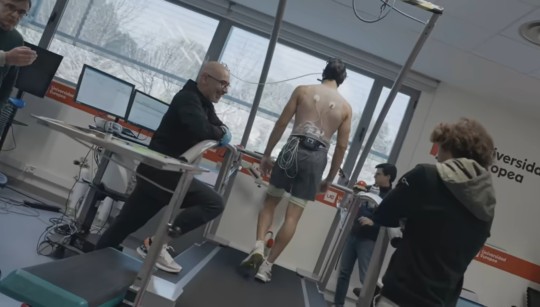

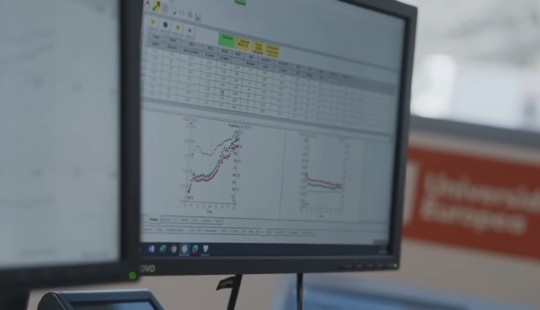
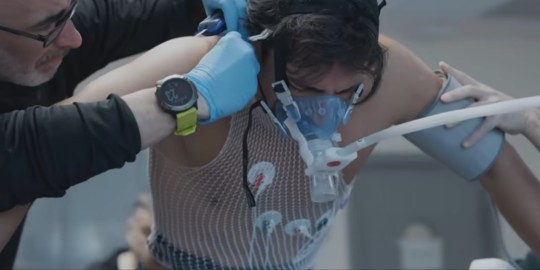
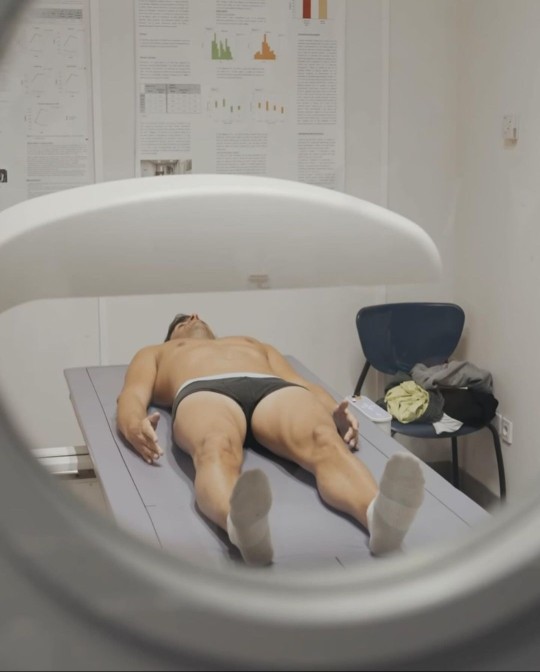

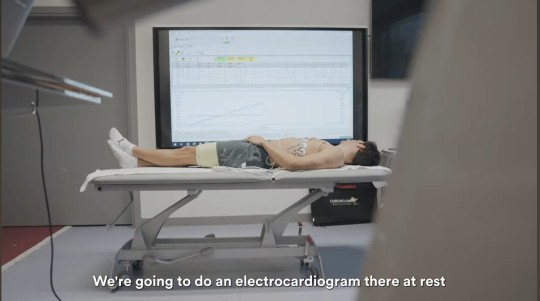
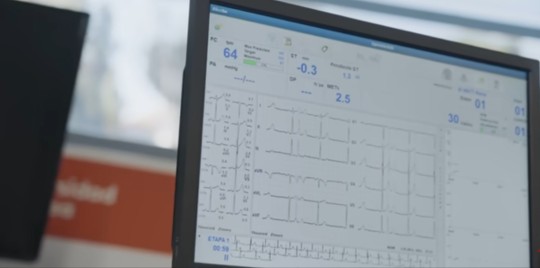
#resus writing#cardiopulmonary resuscitation#male cpr#cardiophilia#cpr resus#stress test#hyperventilating#male defib#defibrillation#cardiac arrhythmia#cardiac arrest#heart attack
50 notes
·
View notes
Text

I had an ECG test today as I felt some kind of suffocation and fast heart rate at midnight in the past couple of weeks. It was especially intense after tennis training. Fortunately my ECG result assured that my heart was normal. The physician just advised me to stop intensive tennis training for a few days.
#heartbeat#heart#cardiachealth#heart attack#ecg test#ecg#electrocardiography#cardiac arrhythmia#male heartbeat
61 notes
·
View notes
Text


Kimi wa Houkago Insomnia Ep 7 - Isaki reveals her secret to Ganta.
129 notes
·
View notes
Text
Whump Prompt #1343
Submitted by Anon - thanks!
Your whumpee has a chronic arrhythmia condition and all caretaker has is a stethoscope...
#wasnt sure if this was asking for prompts or a submission#sorry anon#whump#writing#prompts#heart condition#cardiac arrhythmia#edited ask#worry#angst
33 notes
·
View notes
Text
Doctor 1: What’s the best antiarrhythmic for venticular tachycardia?
Doctor 2: Propofol, fentanyl and 200 Joules.
76 notes
·
View notes
Text
@lieahsblog Has been screaming into the void and sharing regular updates on this particular campaign to help boost it for Razan, her mother Ghada and their family.
Ghada has a heart condition and needs medical intervention that she can't get in Gaza. Razan shared her mother's ECG:
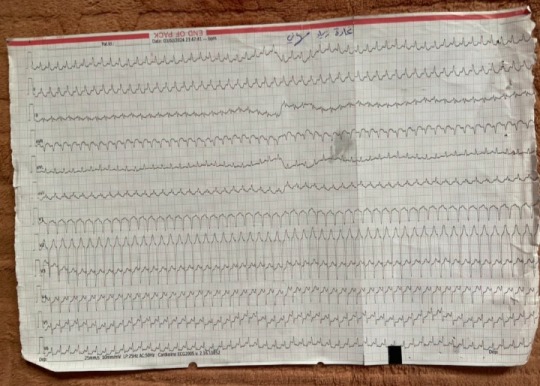
And the details of her mother's report:
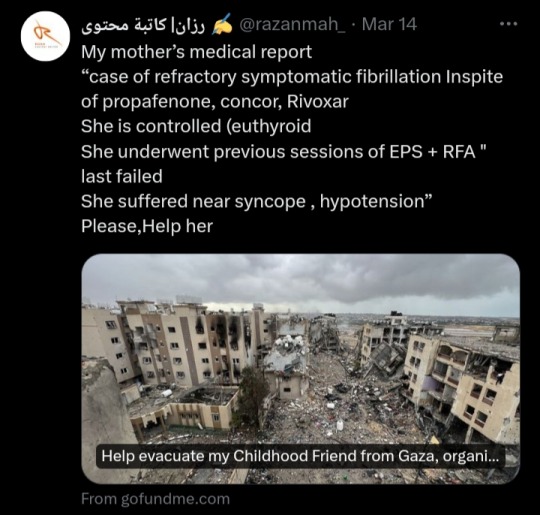
All to help us understand the URGENCY
Basically, Ghada has an abnormal heartbeat (arrhythmia) despite her medications. She did Electrophysiology Studies (EPS) to identify the cause and a Radiofrequency Ablation (RFA) to try to remove the problem area from the heart once it was found but the procedure failed and Ghada had a drop in blood pressure and near loss of consciousness.
This isn't something Razan should have had to do at all, sharing private medical details with the world, it should be enough that they genuinely need help. Hell, her family and other families in Gaza shouldn't have to be pleading for donations to be able to leave their own home and live either.
We can get shows that have been off air for years trending. We can create viral posts on the most random topics. I know there a lot of families that need help and maybe that's tiring to keep seeing for some but that's the reality. Gaza is suffering a horrific genocide and forced famine and a complete breakdown of their healthcare. They need help and a simple reblog can help them. If you really can't donate at least share but if you can spare anything at all please do it!
#gaza#go fund me#donations#urgent appeal#urgent medical care needed#donate if you can#mutual aid#go fund them#boost#signal boost#boost the signal#please help#please share#save palestinians#current events#free gaza#palestine#free palestine#reblog#genocide in gaza#heart condition#cardiac arrhythmia#gofundme#urgent#help needed#gaza fundraiser#medical aid for palestinians#even a small donation can go a long way#donation for gaza#evacuation
11 notes
·
View notes
Text
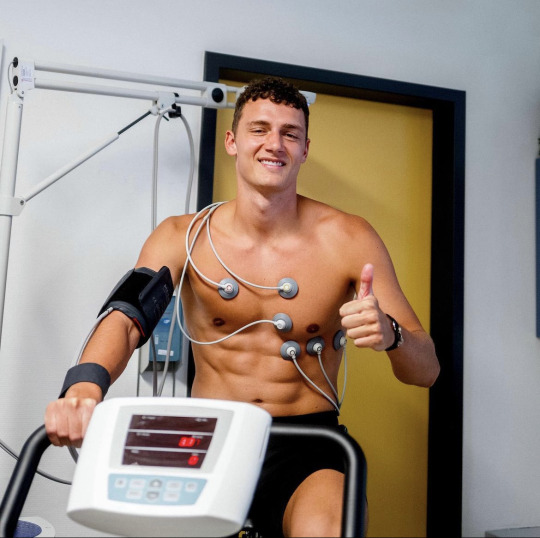
French football player having his heart checked at peak stress.
12 notes
·
View notes
Text
Is it hot in here? 🔥🌡
22 notes
·
View notes
Text

this won't hurt
25 notes
·
View notes
Text
Understanding Heart Rhythm Disorders and Their Impact on Cardiovascular Health
Introduction:
Heart rhythm disorders, or arrhythmias, can significantly impact cardiovascular health. These disorders disrupt the heart's normal electrical activity, causing irregular heart rhythms that can affect its ability to pump blood effectively. Understanding the different types of arrhythmias and their implications is crucial for recognizing symptoms, identifying risk factors, and exploring appropriate treatment options.
Common Types of Arrhythmias
Atrial Fibrillation (AF):
Atrial fibrillation is a common arrhythmia characterized by irregular and rapid electrical signals in the heart's upper chambers (atria). This leads to an irregular heart rate. AF increases the risk of blood clots, which can travel to other body parts, causing stroke or other complications.
Bradycardia:
Bradycardia is a slow heart rate, typically below 60 beats per minute. It occurs when the heart's electrical signals are delayed or blocked, decreasing heart rate. Bradycardia can be caused by medications, underlying heart conditions, or heart electrical system issues. Symptoms may include fatigue, Dizziness, fainting, or Shortness of breath.
Tachycardia:
Tachycardia is characterized by a fast heart rate, usually above 100 beats per minute. It occurs when the heart's electrical signals fire abnormally or accelerated. Stress, anxiety, certain medications, or structural abnormalities in the heart can trigger tachycardia. Symptoms may include palpitations, Dizziness, chest pain, or loss of consciousness.
Symptoms, Risk Factors, and Potential Complications
Symptoms of Heart Rhythm Disorders:
Palpitations: Sensation of rapid, fluttering, or irregular heartbeats.
Fatigue: Persistent tiredness or exhaustion, even with minimal physical activity.
Dizziness or lightheadedness: Feeling faint or unsteady.
Shortness of breath: Breathlessness or difficulty breathing, particularly during exertion.
Chest discomfort: Discomfort, pressure, or pain in the chest.
Fainting or near-fainting episodes: Temporary loss of consciousness due to inadequate blood flow to the brain.
Risk Factors:
Age: The risk of arrhythmias generally increases with age.
Family history: Having a close relative with a history of arrhythmias may raise the risk.
High blood pressure: Uncontrolled hypertension can strain the heart and disrupt electrical signals.
Existing heart conditions: Conditions such as coronary artery disease, heart failure, or structural abnormalities can contribute to arrhythmias.
Thyroid disorders: An overactive or underactive thyroid can disrupt the heart's electrical system.
Lifestyle factors: Excessive alcohol or caffeine intake, smoking, drug abuse, and obesity can all play a role in developing arrhythmias.
Potential Complications:
Stroke: Certain arrhythmias, particularly atrial fibrillation, can increase the risk of blood clots forming in the heart, which can travel to the brain and cause a stroke.
Heart failure: Chronic arrhythmias can weaken the heart muscle over time, leading to heart failure, where the heart cannot pump blood effectively.
Sudden cardiac arrest: In some cases, arrhythmias can trigger a sudden loss of heart function, leading to cardiac arrest, a life-threatening emergency requiring immediate medical intervention.
Treatment Options
Treatment for heart rhythm disorders aims to restore or maintain a normal heart rhythm, alleviate symptoms, and reduce the risk of complications. The following treatment options are commonly used:
Medications: Antiarrhythmic drugs may be prescribed to regulate heart rhythm and reduce the frequency or severity of arrhythmias.
Lifestyle modifications: Making lifestyle changes, such as managing stress, maintaining a healthy weight, quitting smoking, limiting alcohol and caffeine consumption, and engaging in regular physical activity, can help manage certain arrhythmias.
Ablation: Catheter ablation is a procedure that involves selectively destroying or isolating abnormal heart tissue responsible for generating arrhythmias. It aims to restore a normal heart rhythm.
Implantable devices: In some cases, implantable devices like pacemakers or cardioverter-defibrillators (ICDs) may be recommended to regulate the heart's electrical signals and deliver appropriate therapy when needed.
Conclusion
Heart rhythm disorders can significantly impact cardiovascular health, affecting the heart's ability to function properly. Recognizing the symptoms, understanding the risk factors, and seeking appropriate treatment is vital for managing arrhythmias and reducing the risk of complications. By working closely with healthcare professionals, individuals with heart rhythm disorders can develop a tailored treatment plan that addresses their specific needs, improves their quality of life, and promotes overall cardiovascular health.
#Cardiac arrhythmia#heart rhythm disorder#cardiac rhythm disturbance#irregular heartbeat#atrial fibrillation
6 notes
·
View notes
Text
it's a little rough and unshaded but uhhh lupus butterfly heart
the pattern on the wing was created from the visible arteries in the photos I referenced, I just extended them to make them butterfly-esque
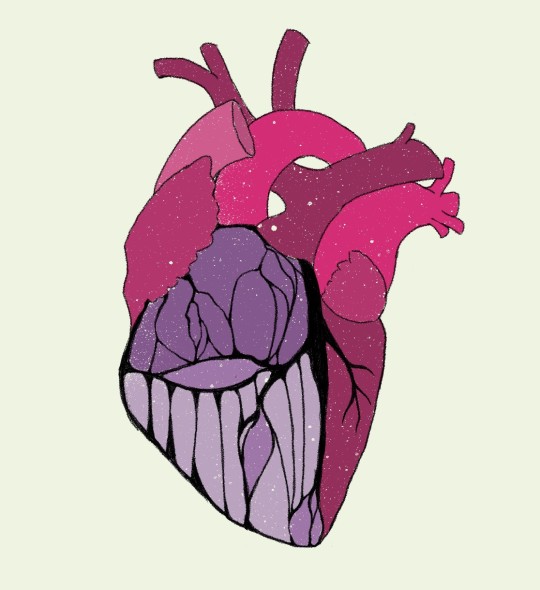
#disability#disabled#chronic illness#chronically ill#systemic lupus erythematosus#cardiac arrhythmia#SLE#physically disabled#physical disability
9 notes
·
View notes
Text

July is Disability Pride month!
An arrhythmia is a problem with the rate or rhythm of your heartbeat. Did you know? Arrhythmias may present in different ways, and some people with the condition are asymptomatic. Others may experience pounding sensations in the chest, chest discomfort, difficulty breathing, fainting, or near-fainting.
[ID: A gray cat lays on a red velvet heart-shaped pillow. Underneath is a textured rug.]
#cats#generated cats#ai generated#ai#midjourney#ai photography#disability pride month#cardiac arrhythmia
4 notes
·
View notes
Text
Student 1: An extra cup coffee doesn’t harm anyone.
Student 2: *documentary style* Unknowingly, [Student 1] accidentally triggered an atrial fibrillation.
#dark humor#medicine#med school#medblr#cardiology#caffeine#coffe#cardiac arrhythmia#atrial fibrillation#pinned
109 notes
·
View notes
Text
2 notes
·
View notes